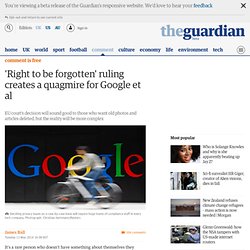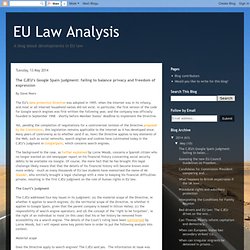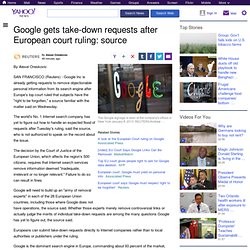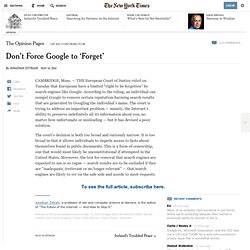

'Right to be forgotten' ruling creates a quagmire for Google et al. It's a rare person who doesn't have something about themselves they would like taken off the internet, whether it's trivial (that picture from the office party) or grave (that news article about those people you killed).

So on the face of it, a new ruling from the EU's court of justice upholding the "right to be forgotten" looks like good news. As the debate around privacy, identity, and ephemerality has raged around the Snowden disclosures for the past year, the idea of putting the genie back in the bottle, and making old photos, articles and notes hard to find once more, will be for many an appealing one.
But behind the lustre lies a much more difficult situation. The EU court's ruling relates to a long-running dispute around a 1998 newspaper article relating to the repossession of a Spanish man's home. This creates a real quagmire for any company offering up information online: after how long does a bankruptcy ruling become something that should be private? Failing to balance privacy and freedom of expression. By Steve Peers The EU’s data protection Directive was adopted in 1995, when the Internet was in its infancy, and most or all Internet household names did not exist.

In particular, the first version of the code for Google search engines was first written the following year, and the company was officially founded in September 1998 – shortly before Member States’ deadline to implement the Directive. Yet, pending the completion of negotiations for a controversial revision of the Directive proposed by the Commission, this legislation remains applicable to the Internet as it has developed since. Many years of controversy as to whether (and if so, how) the Directive applies to key elements of the Web, such as social networks, search engines and cookies have culminated today in the CJEU’s judgment in GoogleSpain, which concerns search engines. The Court’s judgment Material scope Does the Directive apply to search engines?
Territorial scope Responsibility of search engine operators Comments. Google gets take-down requests after European court ruling: source. By Alexei Oreskovic SAN FRANCISCO (Reuters) - Google Inc is already getting requests to remove objectionable personal information from its search engine after Europe's top court ruled that subjects have the "right to be forgotten," a source familiar with the matter said on Wednesday.

The world's No. 1 Internet search company has yet to figure out how to handle an expected flood of requests after Tuesday's ruling, said the source, who is not authorized to speak on the record about the issue. The decision by the Court of Justice of the European Union, which affects the region's 500 citizens, requires that Internet search services remove information deemed "inadequate, irrelevant or no longer relevant. " Failure to do so can result in fines. Google will need to build up an "army of removal experts" in each of the 28 European Union countries, including those where Google does not have operations, the source said.
Microsoft declined to comment. Europe NewsBusinessGoogle Incsearch engine. Dont-force-google-to-forget. CAMBRIDGE, Mass. — THE European Court of Justice ruled on Tuesday that Europeans have a limited “right to be forgotten” by search engines like Google.

According to the ruling, an individual can compel Google to remove certain reputation-harming search results that are generated by Googling the individual’s name. The court is trying to address an important problem — namely, the Internet’s ability to preserve indefinitely all its information about you, no matter how unfortunate or misleading — but it has devised a poor solution. The court’s decision is both too broad and curiously narrow. It is too broad in that it allows individuals to impede access to facts about themselves found in public documents. This is a form of censorship, one that would most likely be unconstitutional if attempted in the United States.